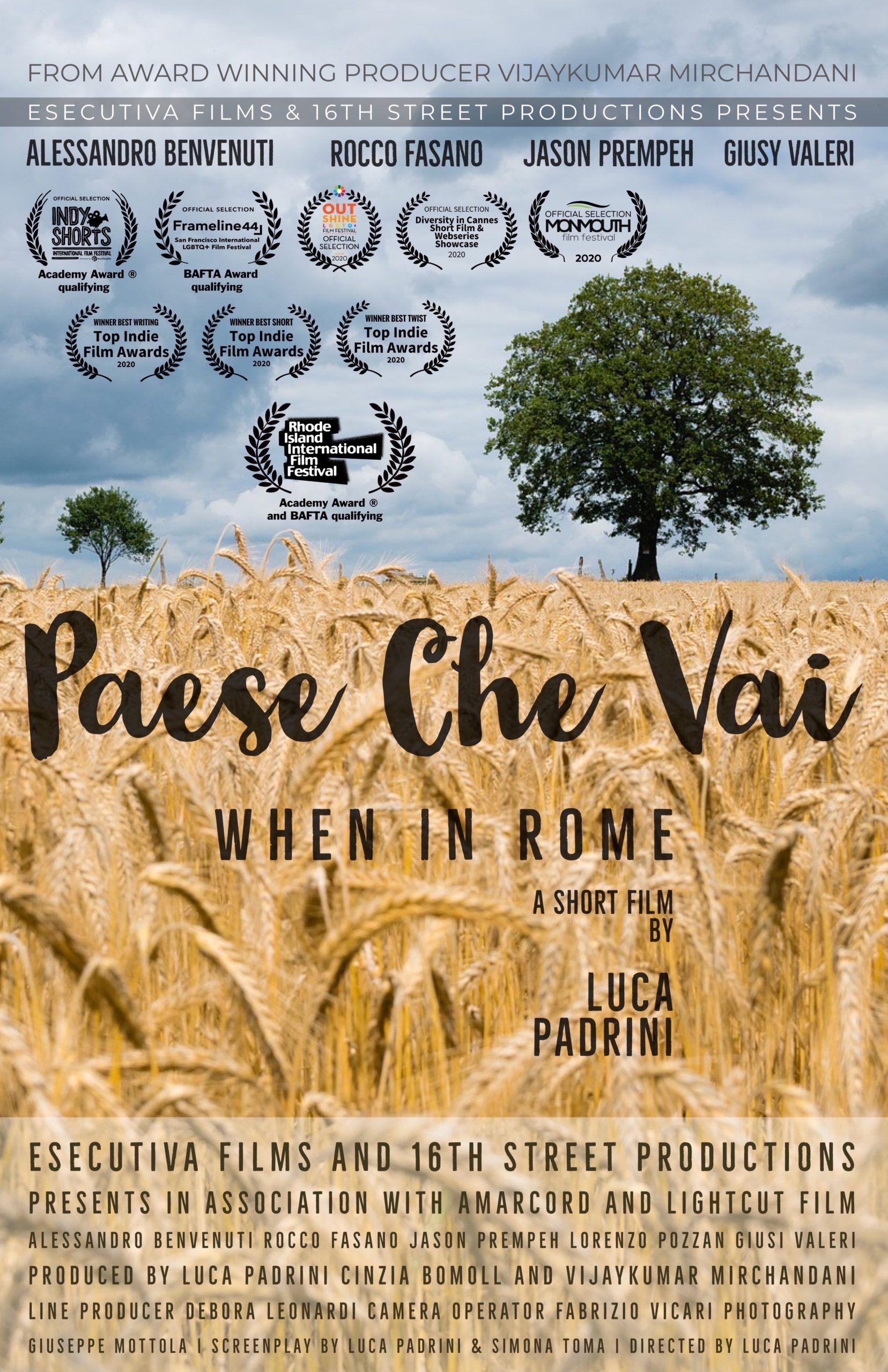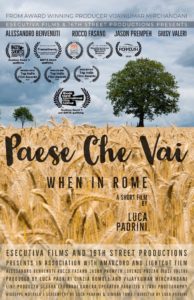
Short Film Review “Paese Che Vai – When In Rome”
WATCH THE TRAILER HERE
First, the Recap:
Appearances. Whether referring to the physical aspects of a person or object or otherwise applying it to any number of situational occurrences, some things are simply not what they seem. When we find ourselves confronted with a surprising revelation that shakes our world, how we choose to handle it will forever speak to the nature of our character, our conscious, our beliefs, and even how we’re looked upon by others. Yet when it comes to family, support should ultimately be the only guideline to adhere to. Alfredo (Rocco Fasano) has come home to Italy with his partner Mattia (Jason Prempeh). Of course, while it entails a reunion with his highly eccentric grandmother Donna Maria (Giusy Valeri) and deeply traditional father Sor Pucci (Alessandro Benvenuti), Alfredo has a secret to reveal that could upend the family forever.
Next, my Mind:
Coming off its World Premier at the 2020 Indy Shorts Film Festival (an Academy Award(R) Qualifying selection, mind you), this endearingly cheeky, wholly entertaining, smartly written, beautifully executed 11-minute short film from writer/director/producer Luca Padrini, writer Simona Toma, and producers Vijaykumar Mirchandani and Cinzia Bomoll takes the entire notion of an LGBTQIA+-themed narrative and brilliantly turns it on is head to create an unexpectedly hilarious journey focused on a young man, his lifestyle choice, and the perils of finally coming out. One can easily see why this film was a multiple award winner at the TOP Indie Film Festival (7 nominations, 3 wins), and has consideration at several other high level events (even though some earlier postponements) like the Frameline 44: San Francisco International LTBTQ+ Film Festival for example, while still hyping its upcoming opportunities, for example the Flickers Rhode Island International Film Festival (an Academy Award(R) and BAFTA Qualifying selection as well as Canadian Screen Awards), which is also a Top 100 rated Festival event.
As one more feather in the cap, the film also has the soon to occur Monmouth International Film Festival, which holds special meaning for producer Mirchandani, given he resides in the Festival’s base of operations, New Jersey. This all said, the film is a tour-de-force of indie film excellence as it tackles the oft dealt with notions of what it is to have chosen a still-maligned lifestyle and the subsequent ramifications of how others react to it, especially family. There’s still a stigma about acceptance of the lifestyle depicted when familial expectations, customs, traditions, and parent-driven plans are in play, and this narrative does a masterful job at exploring all of it with deft precision, but not quite in the way you anticipate as the story unfolds. In fact, the wondrous cleverness in presentation here helps to deliver a particular moment of such absolutely genius disclosure that the entire tone and mood of the film radically changes for the comedic, and does so with resounding flair and aptitude.
Additionally, it is the finesse by which this tonal shift is brought about that gives the film such a strong core message about just how we as people do tend to so overtly overreact and/or trip over the decisions our friends or, here, a family member make, more so when it doesn’t fit that preconceived mold we have in our minds, acting as if it’s the end of the world, never to be resolved or truly recognized as valid, and even thinking we can also never recover from the sheer shock of it all. While this is all quite adequately covered in this film, as done many times with LGTBQIA+-based tales, the utilization of these drastic behaviors when learning a despairing truth is applied in the most unanticipated, magnificently creative, intelligent, and totally hysterical way, and as I’ve continued to state countless times, it just shows you how the mind of an indie filmmaker works to portray that which is “the norm” and turn it into a fresh idea that can reinvent, even redefine, a common but still deeply important thematic exploration that applies to our society.
Yet another key factor employed here is the charmingly appropriate music score that buoys the events with delightfully lively, boisterous fun that so expertly fits the film’s ultimate bearing, aiding further in making the grander relatability of everything represented and illustrated stand out in spades, which is also the ever-present magic of independent cinema. Fasano plays his role as Alfredo with a true sense of realistic mix of both subdued and blatant emotional intensity that really suits the dramatic and jocular sequences found in the story. A young man who only wishes to finally come clean to his traditionalist father in regard to the lifestyle he’s chosen to lead, Alfredo’s manner in approaching it ebbs and flows with the tone of events around him, and this only makes the actual instance of his announcement that much more riotous. It’s the believability Fasano brings to the character that endears us to him from the start, which is a true credit to the actor for how wonderfully he imbues Alfredo with the personality he does.
Veteran Italian actor Benvenuti is an equally adept barrel of laughs and undeniably scene-stealing presense through his portrayal of Alfredo’s splendidly amusing, over-the-top, but doting father Sor Pucci, whose more than proud of his family’s longstanding heritage in the small Italian town in which he has resided, the successful business he runs (innuendos pouring forth not withstanding. Watch the film, folks!), and the love and commitment (and ideal plans) he has for his beloved son Alfredo. All of these attitudes colliding upon Alfredo’s disclosure makes his reactions to it all uproariously funny to watch, especially in the greater context of what you think is coming, and he questions everything he’s done as a father, though still showcases what becomes the most important point of impact in it all–the strong, unconditional support of his son regardless of choices made. It’s a fantastic character to watch, and Benvenuti assuredly make it his own in all the best possible ways.
Primary supporting appearances are made first by Prempeh as Alfredo’s partner Mattia, who seems to more involuntarily get stuck in the middle of the whole situation, but never wavers in being there for Alfredo in his time of needed divulgence and the decision to move forward with it. Then there is Valeri’s own unforgettable scene-stealing moments on screen as Alfredo’s–peculiarly unconventional–grandmother Donna Maria, whose own life is taking new turns while also being another example of the non-judgmental acceptance she provides to Alfredo and his lifestyle, while just being a hoot to watch. Additional supporting appearances are made by Lorenzo Pozzan as a former childhood friend of Alfredo’s who doesn’t quite support him in his life choice, Sarah Jane Bannister and Chloè Ercoli as the Jackson sisters, locals who get the “honor” of being on the receiving end of Sor Pucci’s–candid expounding–about the elements involved with his profession, Claudio Ercoli as Gianni, plus Adriano Sacco and Federico Loppi.
In total, “Paese Che Vai – When In Rome” is a consummately polished exercise in the skillfully applied prowess and artistry found in the indie film ranks, complete with not just its astute twist, high entertainment quotient and dramedy foundations, but also in its ability to paint a vivid and necessary picture of relevent contemporary themes that one can hope will prompt us all to consider our own attitudes about how we do or do not accept so many of the things around us. Perhaps we can at least realize that while we may not always agree on certain things, there are still ways to express that without hate and anger, but instead with understanding. This is a film to watch and watch out for, because indie cinema’s star continues to be what it should be-a rising star.
As always, this is all for your consideration and comment. Until next time, thank you for reading!




